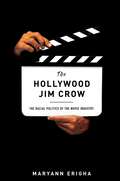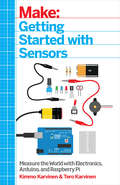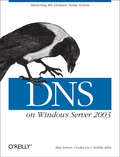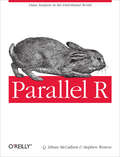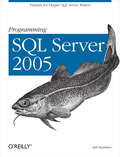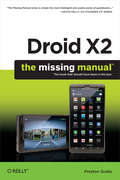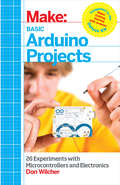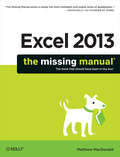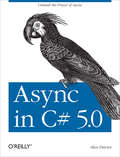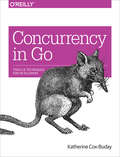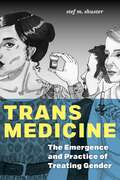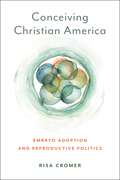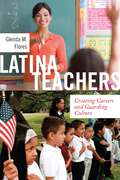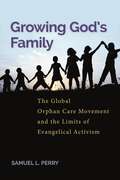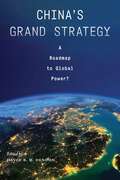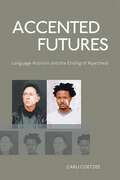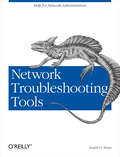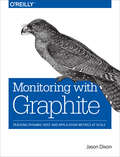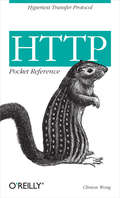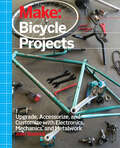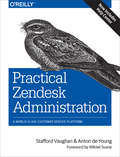- Table View
- List View
The Hollywood Jim Crow: The Racial Politics of the Movie Industry
by Maryann ErighaThe story of racial hierarchy in the American film industry The #OscarsSoWhite campaign, and the content of the leaked Sony emails which revealed, among many other things, that a powerful Hollywood insider didn’t believe that Denzel Washington could “open” a western genre film, provide glaring evidence that the opportunities for people of color in Hollywood are limited. In The Hollywood Jim Crow, Maryann Erigha tells the story of inequality, looking at the practices and biases that limit the production and circulation of movies directed by racial minorities. She examines over 1,300 contemporary films, specifically focusing on directors, to show the key elements at work in maintaining “the Hollywood Jim Crow.” Unlike the Jim Crow era where ideas about innate racial inferiority and superiority were the grounds for segregation, Hollywood’s version tries to use economic and cultural explanations to justify the underrepresentation and stigmatization of Black filmmakers. Erigha exposes the key elements at work in maintaining Hollywood’s racial hierarchy, namely the relationship between genre and race, the ghettoization of Black directors to black films, and how Blackness is perceived by the Hollywood producers and studios who decide what gets made and who gets to make it. Erigha questions the notion that increased representation of African Americans behind the camera is the sole answer to the racial inequality gap. Instead, she suggests focusing on the obstacles to integration for African American film directors. Hollywood movies have an expansive reach and exert tremendous power in the national and global production, distribution, and exhibition of popular culture. The Hollywood Jim Crow fully dissects the racial inequality embedded in this industry, looking at alternative ways for African Americans to find success in Hollywood and suggesting how they can band together to forge their own career paths.
Getting Started with Sensors: Measure the World with Electronics, Arduino, and Raspberry Pi
by Tero Karvinen Kimmo KarvinenTo build electronic projects that can sense the physical world, you need to build circuits based around sensors: electronic components that react to physical phenomena by sending an electrical signal. Even with only basic electronic components, you can build useful and educational sensor projects.But if you incorporate Arduino or Raspberry Pi into your project, you can build much more sophisticated projects that can react in interesting ways and even connect to the Internet. This book starts by teaching you the basic electronic circuits to read and react to a sensor. It then goes on to show how to use Arduino to develop sensor systems, and wraps up by teaching you how to build sensor projects with the Linux-powered Raspberry Pi.
DNS on Windows Server 2003: Mastering the Domain Name System
by Cricket Liu Robbie Allen Matt LarsonWhile computers and other devices identify each other on networks or the Internet by using unique addresses made up of numbers, humans rely on the Domain Name System (DNS), the distributed database that allows us to identify machines by name. DNS does the work of translating domain names into numerical IP addresses, routing mail to its proper destination, and many other services, so that users require little or no knowledge of the system. If you're a network or system administrator, however, configuring, implementing, and maintaining DNS zones can be a formidable challenge. And now, with Windows Server 2003, an understanding of the workings of DNS is even more critical.DNS on Windows Server 20003 is a special Windows-oriented edition of the classic DNS and BIND, updated to document the many changes to DNS, large and small, found in Windows Server 2003. Veteran O'Reilly authors, Cricket Liu, Matt Larson, and Robbie Allen explain the whole system in terms of the new Windows Server 2003, from starting and stopping a DNS service to establishing an organization's namespace in the global hierarchy. Besides covering general issues like installing, setting up, and maintaining the server, DNS on Windows Server 2003 tackles the many issues specific to the new Windows environment, including the use of the dnscmd program to manage the Microsoft DNS Server from the command line and development using the WMI DNS provider to manage the name server programmatically. The book also documents new features of the Microsoft DNS Server in Windows Server 2003, including conditional forwarding and zone storage in Active Directory (AD) application partitions.DNS on Windows Server 2003 provides grounding in:Security issuesSystem tuningCachingZone change notificationTroubleshootingPlanning for growthIf you're a Windows administrator, DNS on Windows Server 2003 is the operations manual you need for working with DNS every day. If you're a Windows user who simply wants to take the mystery out of the Internet, this book is a readable introduction to the Internet's architecture and inner workings.
Illustrated Guide to Home Chemistry Experiments: All Lab, No Lecture
by Robert Bruce ThompsonFor students, DIY hobbyists, and science buffs, who can no longer get real chemistry sets, this one-of-a-kind guide explains how to set up and use a home chemistry lab, with step-by-step instructions for conducting experiments in basic chemistry -- not just to make pretty colors and stinky smells, but to learn how to do real lab work:Purify alcohol by distillationProduce hydrogen and oxygen gas by electrolysisSmelt metallic copper from copper ore you make yourselfAnalyze the makeup of seawater, bone, and other common substancesSynthesize oil of wintergreen from aspirin and rayon fiber from paperPerform forensics tests for fingerprints, blood, drugs, and poisonsand much moreFrom the 1930s through the 1970s, chemistry sets were among the most popular Christmas gifts, selling in the millions. But two decades ago, real chemistry sets began to disappear as manufacturers and retailers became concerned about liability. ,em>The Illustrated Guide to Home Chemistry Experiments steps up to the plate with lessons on how to equip your home chemistry lab, master laboratory skills, and work safely in your lab. The bulk of this book consists of 17 hands-on chapters that include multiple laboratory sessions on the following topics:Separating MixturesSolubility and SolutionsColligative Properties of SolutionsIntroduction to Chemical Reactions & StoichiometryReduction-Oxidation (Redox) ReactionsAcid-Base ChemistryChemical KineticsChemical Equilibrium and Le Chatelier's PrincipleGas ChemistryThermochemistry and CalorimetryElectrochemistryPhotochemistryColloids and SuspensionsQualitative AnalysisQuantitative AnalysisSynthesis of Useful CompoundsForensic ChemistryWith plenty of full-color illustrations and photos, Illustrated Guide to Home Chemistry Experiments offers introductory level sessions suitable for a middle school or first-year high school chemistry laboratory course, and more advanced sessions suitable for students who intend to take the College Board Advanced Placement (AP) Chemistry exam. A student who completes all of the laboratories in this book will have done the equivalent of two full years of high school chemistry lab work or a first-year college general chemistry laboratory course.This hands-on introduction to real chemistry -- using real equipment, real chemicals, and real quantitative experiments -- is ideal for the many thousands of young people and adults who want to experience the magic of chemistry.
Parallel R: Data Analysis in the Distributed World
by Stephen Weston Q. Ethan McCallumIt’s tough to argue with R as a high-quality, cross-platform, open source statistical software product—unless you’re in the business of crunching Big Data. This concise book introduces you to several strategies for using R to analyze large datasets, including three chapters on using R and Hadoop together. You’ll learn the basics of Snow, Multicore, Parallel, Segue, RHIPE, and Hadoop Streaming, including how to find them, how to use them, when they work well, and when they don’t.With these packages, you can overcome R’s single-threaded nature by spreading work across multiple CPUs, or offloading work to multiple machines to address R’s memory barrier.Snow: works well in a traditional cluster environmentMulticore: popular for multiprocessor and multicore computersParallel: part of the upcoming R 2.14.0 releaseR+Hadoop: provides low-level access to a popular form of cluster computingRHIPE: uses Hadoop’s power with R’s language and interactive shellSegue: lets you use Elastic MapReduce as a backend for lapply-style operations
Programming SQL Server 2005: Prepare for Deeper SQL Server Waters
by Bill HamiltonSQL Server 2005, Microsoft's next-generation data management and analysis solution, represents a huge leap forward. It comes with a myriad of changes that deliver increased security, scalability, and power--making it the complete data package. Used properly, SQL Server 2005 can help organizations of all sizes meet their data challenges head on.Programming SQL Server 2005 from O'Reilly provides a practical look at this updated version of Microsoft's premier database product. It guides you through all the new features, explaining how they work and how to use them. The first half of the book examines the changes and new features of the SQL Server Engine itself. The second addresses the enhanced features and tools of the platform, including the new services blended into this popular version. Each chapter contains numerous code samples-written in C# and compiled using the Visual Studio 2005 development environment-that show you exactly how to program SQL Server 2005.Programming SQL Server 2005 can help you:Build, deploy, and manage enterprise applications that are more secure, scalable, and reliableMaximize IT productivity by reducing the complexity of building, deploying, and managing database applicationsShare data across multiple platforms, applications, and devices to make it easier to connect internal and external systemsBecause the goal of Programming SQL Server 2005 is to introduce all facets of Programming SQL Server 2005, it's beneficial to programmers of all levels. The book can be used as a primer by developers with little experience with SQL Server, as a ramp up to the new programming models for SQL Server 2005 for more experienced programmers, or as background and primer to specific concepts.Any IT professional who wants to learn about SQL Server 2005's comprehensive feature set, interoperability with existing systems, and automation of routine tasks will find the answers in this authoritative guide.
Droid X2: The Missing Manual
by Preston GrallaDroid X2 has more power and better graphics than its predecessor, but it still doesn’t offer a printed guide to its amazing features. This Missing Manual helps you dig deep into everything Droid X2 can do. Learn how to shop, keep in touch, play with photos, listen to music, and even do some work. Unleash the power of this popular device with expert advice.The important stuff you need to know:Get organized. Sync Droid X2 with Google Calendar, Exchange, and Outlook.Go online. Navigate the Web, use email, and tap into Facebook and Twitter.Listen to tunes. Play and manage music using Droid X2’s Music app and Google’s Music Cloud Player.Shoot photos and video. View and edit photos, slideshows, and video in the Gallery.Connect to Google Maps. Use geotagging and get turn-by-turn directions.Stay productive. Create, edit, and store documents with Google Docs and Microsoft Office.
Basic Arduino Projects: 26 Experiments with Microcontrollers and Electronics
by Don WilcherThis companion book to MakerShed's Ultimate Arduino Microcontroller Pack provides 26 clearly explained projects that you can build with this top-selling kit right away--including multicolor flashing lights, timers, tools for testing circuits, sound effects, motor control, and sensor devices.With the Ultimate Arduino Microcontroller Pack, you'll find everything from common components such as resistors and capacitors to specialized sensors and actuators like force-sensing resistors and motors. The kit also features the Arduino Uno Microcontroller and a MakerShield, the definitive prototyping shield for Arduino.Build 26 cool mini Arduino projects and gadgetsWork on projects that are both instructive and have practical applicationGet circuit diagrams and detailed instructions for building each projectUnderstand circuit design and simulation with easy-to-use tools
Excel 2013: The Missing Manual (The\missing Manual Ser.)
by Matthew MacDonaldThe world’s most popular spreadsheet program is now more powerful than ever, but it’s also more complex. That’s where this Missing Manual comes in. With crystal-clear explanations and hands-on examples, Excel 2013: The Missing Manual shows you how to master Excel so you can easily track, analyze, and chart your data. You’ll be using new features like PowerPivot and Flash Fill in no time.The important stuff you need to know:Go from novice to ace. Learn how to analyze your data, from writing your first formula to charting your results.Illustrate trends. Discover the clearest way to present your data using Excel’s new Quick Analysis feature.Broaden your analysis. Use pivot tables, slicers, and timelines to examine your data from different perspectives.Import data. Pull data from a variety of sources, including website data feeds and corporate databases.Work from the Web. Launch and manage your workbooks on the road, using the new Excel Web App.Share your worksheets. Store Excel files on SkyDrive and collaborate with colleagues on Facebook, Twitter, and LinkedIn.Master the new data model. Use PowerPivot to work with millions of rows of data.Make calculations. Review financial data, use math and scientific formulas, and perform statistical analyses.
Async in C# 5.0: Unleash the Power of Async
by Alex DaviesIf you’re writing one of several applications that call for asynchronous programming, this concise hands-on guide shows you how the async feature in C# 5.0 can make the process much simpler. Along with a clear introduction to asynchronous programming, you get an in-depth look at how the async feature works and why you might want to use it in your application.Written for experienced C# programmers—yet approachable for beginners—this book is packed with code examples that you can extend for your own projects.Write your own asynchronous code, and learn how async saves you from this messy choreDiscover new performance possibilities in ASP.NET web server codeExplore how async and WinRT work together in Windows 8 applicationsLearn the importance of the await keyword in async methodsUnderstand which .NET thread is running your code—and at what points in the programUse the Task-based Asynchronous Pattern (TAP) to write asynchronous APIs in .NETTake advantage of parallel computing in modern machinesMeasure async code performance by comparing it with alternatives
Concurrency in Go: Tools and Techniques for Developers
by Katherine Cox-BudayConcurrency can be notoriously difficult to get right, but fortunately, the Go open source programming language makes working with concurrency tractable and even easy. If you’re a developer familiar with Go, this practical book demonstrates best practices and patterns to help you incorporate concurrency into your systems.Author Katherine Cox-Buday takes you step-by-step through the process. You’ll understand how Go chooses to model concurrency, what issues arise from this model, and how you can compose primitives within this model to solve problems. Learn the skills and tooling you need to confidently write and implement concurrent systems of any size.Understand how Go addresses fundamental problems that make concurrency difficult to do correctlyLearn the key differences between concurrency and parallelismDig into the syntax of Go’s memory synchronization primitivesForm patterns with these primitives to write maintainable concurrent codeCompose patterns into a series of practices that enable you to write large, distributed systems that scaleLearn the sophistication behind goroutines and how Go’s runtime stitches everything together
Trans Medicine: The Emergence and Practice of Treating Gender
by stef m. shuster**Finalist, PROSE Award in Clinical Medicine**A rich examination of the history of trans medicine and current day practice Surfacing in the mid-twentieth century, yet shrouded in social stigma, transgender medicine is now a rapidly growing medical field. In Trans Medicine, stef shuster makes an important intervention in how we understand the development of this field and how it is being used to “treat” gender identity today. Drawing on interviews with medical providers as well as ethnographic and archival research, shuster examines how health professionals approach patients who seek gender-affirming care. From genital reconstructions to hormone injections, the practice of trans medicine charts new medical ground, compelling medical professionals to plan treatments without widescale clinical trials to back them up. Relying on cultural norms and gut instincts to inform their treatment plans, shuster shows how medical providers’ lack of clinical experience and scientific research undermines their ability to interact with patients, craft treatment plans, and make medical decisions. This situation defies how providers are trained to work with patients and creates uncertainty. As providers navigate the developing knowledge surrounding the medical care of trans folk, Trans Medicine offers a rare opportunity to understand how providers make decisions while facing challenges to their expertise and, in the process, have acquired authority not only over clinical outcomes, but over gender itself.
Conceiving Christian America: Embryo Adoption and Reproductive Politics (Anthropologies of American Medicine: Culture, Power, and Practice)
by Risa CromerWinner of the 2024 Eileen Basker Memorial Prize from the Society for Medical AnthropologyHow embryo adoption advances the Christian Right’s political goals for creating a Christian nationIn 1997, a group of white pro-life evangelical Christians in the United States created the nation’s first embryo adoption program to “save” the thousands of frozen human embryos remaining from assisted reproduction procedures, which they contend are unborn children. While a small part of US fertility services, embryo adoption has played an outsized role in conservative politics, from high-profile battles over public investment in human embryonic stem cell research to the overturning of Roe v. Wade. Based on six years of ethnographic research with embryo adoption staff and participants, Risa Cromer uncovers how embryo adoption advances ambitious political goals for expanding the influence of conservative Christian values and power.Conceiving Christian America is the first book on embryo adoption tracing how this powerful social movement draws on white saviorist tropes in their aims to reconceive personhood, with drastic consequences for reproductive rights and justice. Documenting the practices, narratives, and beliefs that move embryos from freezers to uteruses, this book wields anthropological wariness as a tool for confronting the multiple tactics of the Christian Right. Timely and provocative, Conceiving Christian America presents a bold and nuanced examination of a family-making process focused on conceiving a Christian nation.
Light in the Heavens: Sayings of the Prophet Muhammad (Library of Arabic Literature #40)
by al-Qāḍī al-QuḍāʿīHumanitarian lessons and practical insights from the prophet of IslamThe words of Muhammad, messenger of God and prophet of Islam, have a special place in the hearts of his followers. Wielding an authority second only to the Qur'an, they are cited by scholars in a vast array of disciplines—including law, theology, metaphysics, poetry, grammar, history, and medicine—and are quoted by Muslims to one another in their daily lives. Light in the Heavens by al-Qadi al-Quda'i, a Sunni judge in the Fatimid court in Egypt, is an outstanding example of a compilation of these sayings, known as hadiths, that circulated orally and were later assembled and written down. From North Africa to India, generations have used Light in the Heavens as a teaching text for children as well as adults, and many of its 1,200 sayings are familiar to individuals of diverse denominations and ethnicities. For Muslims—who consider Muhammad’s teachings the fount of wisdom and the beacon of guidance in all things, mundane and sublime—these sayings provide a direct window into the inspired vision of one of the most influential humans to have walked the Earth. An English-only edition.
Latina Teachers: Creating Careers and Guarding Culture (Latina/o Sociology #3)
by Glenda M. FloresWinner, 2018 Outstanding Contribution to Scholarship Book Award presented by the American Sociological Association's Section on Race, Class, and GenderHonorable Mention, 2018 Distinguished Contribution to Research Book Award presented by the American Sociological Association's Latina/o Sociology SectionHow Latina teachers are making careers and helping students stay in touch with their roots.Latina women make up the fastest growing non-white group entering the teaching profession at a time when it is estimated that 20% of all students nationwide now identify as Latina/o. Through ethnographic and participant observation in two underperforming majority-minority schools in Los Angeles, as well as interviews with teachers, parents and staff, Latina Teachers examines the complexities stemming from a growing workforce of Latina teachers. The teachers profiled use Latino cultural resources and serve as agents of ethnic mobility. They actively teach their students how to navigate American race and class structures while retaining their cultural roots, necessary tactics in an American education system that has not fully caught up with the nation’s demographic changes. Flores also explores the challenges faced by Latina teachers, including language barriers and cultural acclimation, and professional inequalities that continue to affect women of color at work. An unprecedented look at an understudied population, Latina Teachers presents an important picture of the women who are increasingly shaping the way America’s children are educated.
Place of Thorns: Black political protest in Kroonstad since 1976
by Tshepo MoloiBased on scores of life-history interviews, the book illustrates a shift in the political mood from 1976 onwards.Place of Thorns: Black Political protest in Kroonstad since 1976, is a landmark study that examines the tumultuous and often fractious politics in Kroonstad's black townships.In spite of the town's relative obscurity, the author demonstrates a rich tradition of civic and political life in its townships and provides a persuasive explanation for the violence unleashed in the 1990s after decades of relative political 'quiescence'. Inspired by the philosophies of black consciousness and the Congress movement, students developed a radical attitude and they spearheaded and shaped political protests in the townships up to the 1990s. However, tensions between the local civic associations and the regional and national ANC leadership ultimately cost the ANC the first democratic local government elections in Kroonstad. As a work of revisionist history, this book showcases South Africa's nuanced liberation history that unfolded in smaller, less known places.The book is essential reading for scholars and students, and everyone interested in the South African liberation history, 'local' histories, political mobilisation and protests.
The Sex Offender Housing Dilemma: Community Activism, Safety, and Social Justice
by Monica WilliamsThe controversy surrounding community responses to housing for sexually violent predators When a South Carolina couple killed a registered sex offender and his wife after they moved into their neighborhood in 2013, the story exposed an extreme and relatively rare instance of violence against sex offenders. While media accounts would have us believe that vigilantes across the country lie in wait for predators who move into their neighborhoods, responses to sex offenders more often involve collective campaigns that direct outrage toward political and criminal justice systems. No community wants a sex offender in its midst, but instead of vigilantism, Monica Williams argues, citizens often leverage moral, political, and/or legal authority to keep these offenders out of local neighborhoods. Her book, the culmination of four years of research, 70 in-depth interviews, participant observations, and studies of numerous media sources, reveals the origins and characteristics of community responses to sexually violent predators (SVP) in the U.S. Specifically, The Sex Offender Housing Dilemma examines the placement process for released SVPs in California and the communities’ responses to those placements. Taking the reader into the center of these related issues, Monica Williams provokes debate on the role of communities in the execution of criminal justice policies, while also addressing the responsibility of government institutions to both groups of citizens. The Sex Offender Housing Dilemma is sure to promote increased civic engagement to help strengthen communities, increase public safety, and ensure government accountability.
Growing God’s Family: The Global Orphan Care Movement and the Limits of Evangelical Activism (Alternative Criminology)
by Samuel L. PerryIllustrates the hidden challenges embedded within the evangelical adoption movement. For over a decade, prominent leaders and organizations among American Evangelicals have spent a substantial amount of time and money in an effort to address what they believe to be the “Orphan Crisis” of the United States. Yet, despite an expansive commitment of resources, there is no reliable evidence that these efforts have been successful. Adoptions are declining across the board, and both foster parenting and foster-adoptions remain steady. Why have evangelical mobilization efforts been so ineffective? To answer this question, Samuel L. Perry draws on interviews with over 220 movement leaders and grassroots families, as well as national data on adoption and fostering, to show that the problem goes beyond orphan care. Perry argues that evangelical social engagement is fundamentally self-limiting and difficult to sustain because their subcultural commitments lock them into an approach that does not work on a practical level. Growing God’s Family ultimately reveals this peculiar irony within American evangelicalism by exposing how certain aspects of the evangelical subculture may stimulate activism to address social problems, even while these same subcultural characteristics undermine their own strategic effectiveness. It provides the most recent analysis of dominant elements within the evangelical subculture and how that subculture shapes the engagement strategies of evangelicals as a group.
China's Grand Strategy: A Roadmap to Global Power?
by David B. H. DenoonLeading scholars examine China’s global strategic plans, from Hong Kong to military power, to economic dominanceOver the past few decades, China has increasingly challenged the global influence of the United States. In China’s Grand Strategy, David B. H. Denoon brings together a group of eminent scholars to explain China’s rapid ascendance on the world stage, as well as its future implications for global politics. Contributors address the military, economic, diplomatic, and internal political factors shaping China’s strategy, in addition to highlighting Beijing’s objectives in different parts of the world, such as Central Asia, Africa, and the Middle East. Ultimately, they explore the promise and perils of China’s rapidly changing political ambitions, showing how the country has made its mark on the twenty-first century. China’s Grand Strategy provides insight into China’s quest to become a global leader, particularly at a time when the future of both China and the US remain uncertain in the context of current crises like the coronavirus pandemic, the ongoing protests in Hong Kong, and escalating tension between top leaders and officials. This book cannot predict the future for China or the US, but the insights offered can help make sense of where we have been and where we are going.
Accented Futures: Language activism and the ending of apartheid
by Carli CoetzeeIn this wonderfully original, intensely personal yet deeply analytical work, Carli Coetzee argues that difference and disagreement can be forms of activism to bring about social change, inside and outside the teaching environment. Since it is not the student alone who needs to be transformed, she proposes a model of teaching that is insistent on the teacher’s scholarship as a tool for hearing the many voices and accents in the South African classroom. For Coetzee, ‘accentedness’ is a description for actively working towards the ending of apartheid by being aware of the legacies of the past, without attempting to empty out or gloss over the conflicts and violence that may exist under the surface. In the broad context of education, ‘accent’ can be an accent of speech; an attitude; a stance against being ‘understood’; yet a way of teaching that requires teacher and pupil to understand each other’s contexts. This is a book about the relationships created by the use of language to convey knowledge, particularly in translation. The ideas it presents are evocative, thought-provoking and challenging at times. Accented Futures makes a significant and important contribution to research on identity in post-apartheid South Africa as well as to the fields of education and translation studies.
Network Troubleshooting Tools: Help for Network Administrators
by Joseph D SloanOver the years, thousands of tools have been developed for debugging TCP/IP networks. They range from very specialized tools that do one particular task, to generalized suites that do just about everything except replace bad Ethernet cables. Even better, many of them are absolutely free. There's only one problem: who has time to track them all down, sort through them for the best ones for a particular purpose, or figure out how to use them?Network Troubleshooting Tools does the work for you--by describing the best of the freely available tools for debugging and troubleshooting. You can start with a lesser-known version of ping that diagnoses connectivity problems, or take on a much more comprehensive program like MRTG for graphing traffic through network interfaces. There's tkined for mapping and automatically monitoring networks, and Ethereal for capturing packets and debugging low-level problems.This book isn't just about the tools available for troubleshooting common network problems. It also outlines a systematic approach to network troubleshooting: how to document your network so you know how it behaves under normal conditions, and how to think about problems when they arise, so you can solve them more effectively.The topics covered in this book include:Understanding your networkConnectivity testingEvaluating the path between two network nodesTools for capturing packetsTools for network discovery and mappingTools for working with SNMPPerformance monitoringTesting application layer protocolsSoftware sourcesIf you're involved with network operations, this book will save you time, money, and needless experimentation.
Monitoring with Graphite: Tracking Dynamic Host and Application Metrics at Scale
by Jason DixonGraphite has become one of the most powerful monitoring tools available today, due to its ease of use, rapid graph prototyping abilities, and a friendly rendering API. With this practical guide, system administrators and engineers will learn how to use this open source tool to track operational data you need to monitor your systems, as well as application-level metrics for profiling your services.Author Jason Dixon, member of the Graphite project, provides a thorough introduction of Graphite from the basics to the skills and tools you need for troubleshooting and scaling out its software components. If you want to learn more about monitoring systems, services, or applications, this is the book you need.Get an introduction to monitoring, including important concepts and terminologyExamine the features and functionality of key Graphite components, including Carbon and WhisperLearn the typical user workflow necessary to create a basic line chartBuild complex charts with chained functions and multiple axes that interact directly with the rendering APIUnderstand how to use the native Graphite dashboard, as well as the more popular third-party dashboardsMaster the art of scaling and troubleshooting high-performance or highly available Graphite clusters
HTTP Pocket Reference: Hypertext Transfer Protocol
by Clinton WongThe HyperText Transfer Protocol, or HTTP, is the backbone of the World Wide Web. HTTP is the language that each web browser (or other web client) uses to communicate with servers around the world. All web programmers, administrators, and application developers need to be familiar with HTTP in order to work effectively.The HTTP Pocket Reference not only provides a solid conceptual foundation of HTTP, it also serves as a quick reference to each of the headers and status codes that comprise an HTTP transaction. The book starts with a tutorial of HTTP, but then explains the client request and server responses in more detail, and gives a thorough technical explanation of more advanced features of HTTP (such as persistent connections and caching).Most people use the Web every day without knowing anything about HTTP, but for those who need to get "beyond the browser," this book is the place to start.
Make: Upgrade, Accessorize, and Customize with Electronics, Mechanics, and Metalwork
by John BaichtalWhat is a bicycle? The answer is a little trickier than you might think. More than just a form of transportation, your bike is a framework on which you can explore and display your own inventiveness.With a full history of the bicycle and information about commercial mods such as adding baby seats and fenders--as well as instruction on wheels, tires, and regular maintenance--this book gives you the tools and ideas to hack your ride your own way. You'll not only find out how to strip down your bike so that you can actually put it back together again, but you'll create a complete bike hacker's workbench, ready for any idea you might have! In Make: Bicycle Projects, you'll learn to:Add EL wire, LEDs, and NEOPixels for cool nighttime travelInstall a SpokePOV kit to see things only your bike seesAdd a DIY Smartphone Rig that keeps you connectedPaint your bike so that it stays paintedTurn your geared steed into a fixieWeld and braze your frameMake a rad chopperLet the sun power your projectsGive an audio component to your frame for alarms, horns, and just making noiseHaul cargo in a basket or mini-trailerTurn your ride into a veritable party trailer replete with color organ!
Practical Zendesk Administration: A World-Class Customer Service Platform
by Stafford Vaughan Anton De YoungImplementing the Zendesk customer service software as part of your company’s operations can be time-consuming, but with the best practices and advice in this hands-on guide, you can shorten the procedure considerably. You’ll learn the purpose, benefits, and pitfalls of each Zendesk feature, with examples of how to configure it to match your company’s needs and processes.Written by written by two experienced Zendesk product trainers, this book is distilled from years of working in the trenches, launching customer implementations, and answering thousands of questions from participants throughout the world. With it, you’ll be able to determine the best way to put Zendesk’s vast potential to work for your company.Apply custom branding to your user-facing support portalMitigate risk by implementing various Zendesk security featuresManage profiles and permissions for users, agents, and administratorsCreate tickets from email, voice, chat, feedback tabs, and social mediaCapture and classify help requests through standard and custom fieldsUse techniques to build an efficient agent support processAutomate your business rules in Zendesk to streamline your workflowProvide your customers with self-service support
